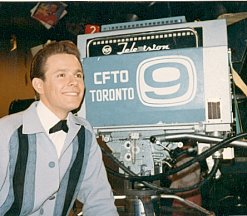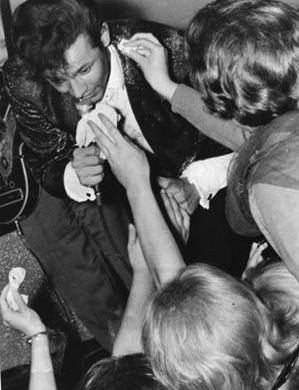With his boy-next-door looks and smooth vocal style, Bobby Curtola had all the perfect qualities to win over fans at the dawn of the Sixties. Beginning with “Hand in Hand with You” at the tender age of 16, the fresh-faced, cardigan-wearing singer scored a string of pop hits and became Canada’s first teen idol. But Curtola didn’t stop there. A charismatic entertainer, he took his talent coast to coast and then to Las Vegas, Nevada, rubbing shoulders with Elvis Presley and Frank Sinatra, and ultimately continued performing into his 70s.
Curtola was born on April 17, 1943 in Port Arthur, Ontario, which later merged into Thunder Bay. While in high school, he juggled a job pumping gas at his father’s garage with performing at sock hops with his group, Bobby and the Bobcats. Soon Curtola came to the attention of songwriting brothers Basil and Dyer Hurdon, who began writing material for the young singer to record for their Tartan label.
Things moved quickly for Curtola. After opening for Bob Hope in Winnipeg, Manitoba he set off on his first tour of Western Canada and then recorded in Nashville, Tennessee with the likes of Chet Atkins at the famous RCS Studio B. After a succession of hits, including “Don’t You Sweetheart Me,” “I’ll Never Be Alone Again” and “Hitchhiker,” Curtola landed the multi-million-selling “Fortune Teller” and his career was set. He toured with Dick Clark’s Cavalcade of Stars and travelled to England, where he appeared on Britain’s Thank Your Lucky Stars.
Television proved the perfect medium for Curtola, whose appearances on U.S. shows like American Bandstand led to hosting jobs on such Canadian TV shows as After Four and Shake, Rock and Roll as well as Miss Canada and Miss Teen Canada pageants. As a spokesman for Coca-Cola, he also reached a wide audience with popular jingles like “Things Go Better With Coke.”
Curtola’s strong presence on the Canadian pop charts throughout the 1960s continued with more hits, including “Aladdin,” and “Three Rows Over,” a bouncy mid-tempo number about classroom romance that cemented his reputation as a crooner of innocent, feel-good music. In all, he released 25 gold singles, 12 gold albums and won the 1966 RPM Award, the precursor to the JUNOS, for Best Male Vocalist.
After helping to establish Canada’s national tour circuit and becoming one of the first artists to launch his own publishing, recording and concert promotion companies, Curtola transitioned from teen idol to Vegas Entertainer . He landed a multi-million-dollar contract in 1972 with the Howard Hughes Hotel chain, where he enjoyed a successful career for over 20 years. Bobby also gave back, raising millions of dollars for charities in Canada through telethons and concerts and also started his own foundation for children in Ecuador.
His status as a pioneer was underscored by his Order of Canada citation in 1998, which stated that Curtola “proved to Canadian artists that it was possible to pursue a career in the recording industry without leaving Canada and still enjoy international success.” His legacy is not only his hits and trailblazing of the industry but all the lives he touched along the way.






